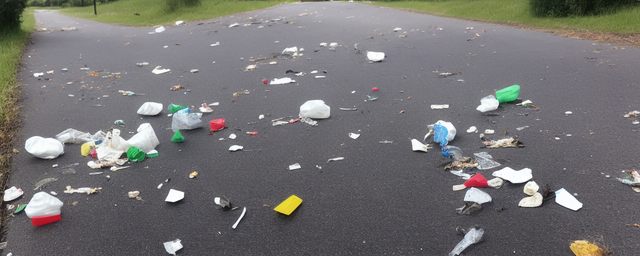
随手乱扔垃圾的危害
原|2024-04-25 20:21:51|浏览:94
Littering, or the act of casually throwing garbage in inappropriate places, poses several dangers and negative impacts on the environment, public health, and society as a whole. Here are some of the key hazards of littering:
1. **Environmental Pollution**: Littering pollutes the environment by introducing non-biodegradable materials such as plastics, glass, and metals into natural ecosystems. These materials can take hundreds of years to decompose, leading to long-term environmental degradation.
2. **Harm to Wildlife**: Animals often mistake litter for food or get entangled in it, leading to injuries or even death. Marine animals are particularly vulnerable to ingesting plastic debris, which can cause internal injuries and disrupt their digestive systems.
3. **Health Risks**: Littered areas can become breeding grounds for pests like rats and mosquitoes, increasing the risk of diseases such as dengue fever and malaria. Decomposing organic waste can also release harmful toxins and odors into the air.
4. **Aesthetics and Tourism**: Littered streets, parks, and beaches are unsightly and can deter tourists and visitors. This can have economic repercussions for local businesses that rely on tourism revenue.
5. **Infrastructure Damage**: Discarded trash can clog storm drains, leading to flooding during heavy rains. It can also damage machinery if it gets caught in equipment used for cleaning or maintenance.
6. **Fire Hazards**: Carelessly discarded cigarette butts or flammable materials can start fires, especially in dry and windy conditions. These fires can quickly spread and endanger lives and property.
7. **Legal and Financial Consequences**: Littering is illegal in most places and can result in fines or other penalties for offenders. Taxpayers bear the cost of cleaning up littered areas, diverting resources that could be used for other public services.
In conclusion, the act of littering has far-reaching consequences that affect not only the environment but also public health, safety, and the economy. It is essential for individuals to take responsibility for their waste and dispose of it properly to mitigate these risks and protect our planet for future generations.
猜你喜欢
- 茶的分类及代表品种
- 六大茶类的代表名茶分别有
- 茶的类型和代表
- 六大茶叶的分类及产地
- 庙的分类及代表
- 藻的分类及其代表
- 茶的分类及代表茶品特点
- 茶的分类及代表茶
- 简述茶类的分类及其代表性名茶
- 六大茶类的分类及代表茶
- 动物分类及代表
- 糖的分类及代表
- 茶的分类及代表茶叶
- 茶的分类及代表图
- 茶的分类及代表作
- 茶器按质地的分类及代表茶器
- 茶的分类及代表名茶教学设计
- 简述茶的分类及代表性名茶
- 请写出乌龙茶的分类及代表茶
- 法国雅文邑白兰地系列
- 雅文邑白兰地介绍
- 1952年法国雅文邑白兰地
- 法国雅玛邑白兰地
- 纽波利顿獒
- 法国犬品种
- 南非獒犬的优缺点
- 波尔多獒犬寿命
- 波兰狩猎犬
- 波尔多犬和罗威纳犬对比
- 波尔多犬和杜高对比
- 世界十大凶犬
- 护卫犬排行榜前十名
- 大红袍怎么泡效果好
- 大红袍怎么泡不开
- 大红袍怎么泡茶
- 大红袍怎么泡出来没颜色
- 大红袍怎么泡不苦
- 大红袍怎么泡多久
- 大红袍怎么泡才正确的特点
- 大红袍怎么泡没有柴味儿
- 大红袍怎么泡放多少合适
- 花香大红袍怎么泡
- 大红袍怎么泡茶好
- 大红袍是怎么泡的
- 大红袍怎么泡水好喝
- 大红袍用玻璃杯怎么泡
- 大红袍怎么泡味道浓一些
- 十大排名果花茶
- 十大花茶组合排名
- 十大花茶品种大全
- 十大花茶功效
- 十大花茶销量排行榜
- 十大花茶有哪些
- 十大花茶品种
- 十大花茶推荐
- 十大花卉排行榜
- 十大花卉
- 十大花茶调理内分泌
- 九五至尊秦昊明月关山
- 红茶冲泡工艺
为你推荐






































































